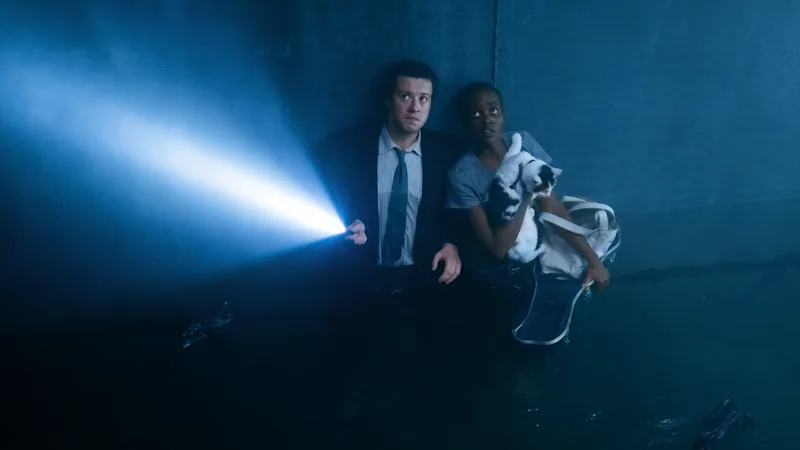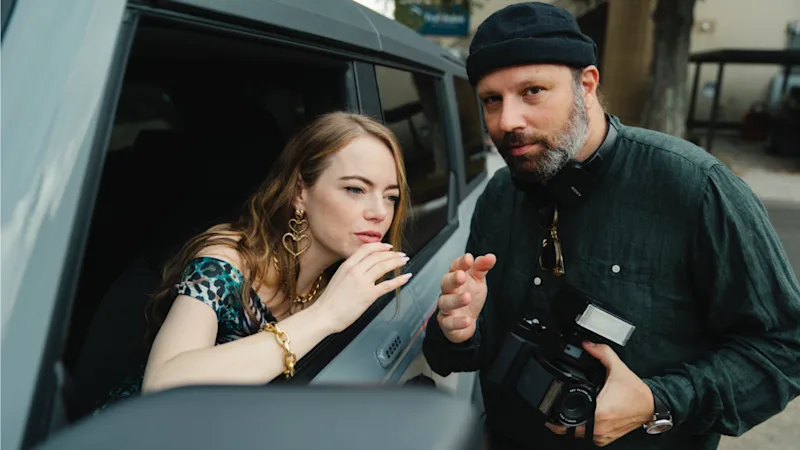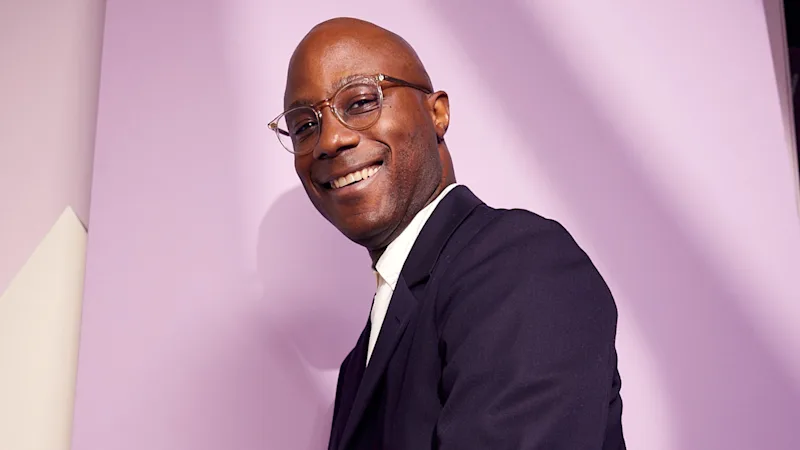For filmmaker Rudy Valdez, Carlos Santana is more than just the subject of his latest documentary. The musician is a trailblazing pop culture icon, sure, but Valdez's connection to Santana is far more personal. "One of the things that really drew me to Carlos, on a personal level, was that he was somebody I looked up to who looked like me," he says. "He's somebody who broke the mold and exceeded what was expected of him."
"I grew up wanting to have a voice, wanting to be creative and be an artist and a storyteller, but when I looked around, all I saw were people who didn't really embody what I had experienced," the filmmaker reflects on growing up Mexican-American in the Midwest.
During this period, it was Santana who emerged as someone Valdez felt like he could see himself in. "My mom used to play Carlos' music all the time. I remember she said, 'Remember Carlos. He's someone who was probably told to play mariachi music but ended up lighting the world on fire at Woodstock playing rock and roll music. That's somebody you can always look to.'"
Santana's now-iconic 1969 Woodstock performance is, notably, one of moments from his storied career that Valdez spotlights in Carlos. The documentary covers the entirety of the musician's career — from his humble beginnings in Tijuana to his big comeback in the late 1990s — as Santana himself ruminates on it all. Making the film, the director spent countless hours with his subject, but Valdez ultimately never shared with Santana what he personally meant to him.
"I never really told Carlos any of that, because I didn't want to muddy our relationship, but making this film definitely felt like a full-circle moment," Valdez tells A.frame. "It felt very special to me to help tell the story of someone who inspired me so much to go out and make my own way in the world."
A.frame: Carlos Santana has had such a massive, expansive career. When you're making a documentary about someone as accomplished as him, is that at all daunting?
It's terrifying, because in the back of my mind, I was always like, "All I can do is mess this up." That's the only thing I could do, because he's so loved. He's had such a vast career that has spanned so many decades and genres, and all the ebbs and flows of our country. So, I approached the film the same way I approach every project, which is to say, "Let me just dive in and see what presents itself." One of the first things that really stood out to me is that Carlos is an amazing storyteller. He's got an unbelievable memory and such an amazing attention to detail that I immediately thought, "This is going to be in Carlos' voice."
I immediately knew that I wasn't going to interview other artists and his contemporaries, because, well — why would I want to hear someone else reflect back 30 years and try to remember a story about Carlos when I already have him here? And he can tell me the smell of a specific room, and the sound he heard when he set foot on the Woodstock grounds for the first time. He remembers what he felt in those moments. That was the first thing that presented itself to me, and then we uncovered all this amazing archival footage. I thought, "Now I can use Carlos' voice and his POV to really take viewers on an adventure through this footage, and if certain people really were part of his journey, they'll see them there." Bill Graham and Clive Davis and all these people who were part of his life show up in the archival footage we had, so the film really showed itself to me over time, and I tried to be patient enough to discover what it was as we made it.
Beyond deciding not to do other interviews, were there other creative decisions that you made early on.
As a director, I try not to box myself in. I felt like I wanted to go through the process of actually letting Carlos tell us about his journey, and then if we got to a point where we weren't going to be able to tell the full story, we'd bring in other interviews. But my initial thought was, "Let's see if we can do this with just Carlos, because that would be amazing." In addition to his voice and stories, we also uncovered some of these old home videos of him just playing the guitar. I watched those and I thought, "I also want the score to be his." It's like you're fully in Carlos' hands from beginning to end. He's telling you his story, he's playing his music, and you're allowed to live within it. That's what we always strove for.
What was the hardest section of the film to put together?
Every section presented its own challenges, because I wanted there to be a common thread throughout the entire film, which is Carlos' constant search for spirituality, the constant evolution of his music, and the evolution of who he is as a man. At times throughout his career, spirituality really takes the forefront, and at other times, the music does, and at other times, his relationships with his kids and parents do. It was difficult to really find the right balance between all of those elements in a way that didn't ever make it feel like the film was taking too much of a departure from any of them. I never wanted to show Carlos reaching this giant spiritual moment and have the audience forget that he's also one of the most legendary musicians ever. Balancing all of those threads was difficult, because there could probably be an entire documentary made just about his spiritual journey. For us, it was always about finding a way to bring it back to the humanity of the man himself. All of it was really difficult for that reason.


Was there anything that you had to leave on the cutting room floor that you're still disappointed you couldn't include?
There's such an amazing amount of archival footage that there inevitably ended up being stuff on the cutting room floor that's brilliant and beautiful. When you start to put together a film like this, though, you don't want to live too much in 1969, and you don't want it to feel repetitive. There has to be this constant evolution and forward journey throughout the film. So, there were these moments in the editing room where we really had to kill our darlings, and that's the best way to describe it. To me, it's a great sign that you have a pretty good movie when you're killing a bunch of darlings, and we were. There's some really amazing archival footage, in particular, that's still out there. And some amazing, recorded performances that I'm sure will come out in some shape or form down the road, hopefully.
The Woodstock footage is particularly impressive. It's amazing that so much archival footage from that festival and performance still exists.
I had many pinch-me moments throughout the entire process of making this film, but after we had locked our first real cut of it, we screened it for Carlos. I don't like to be in those screenings, because I get way too self-conscious. So, I sat in the very, very front row and Carlos was way behind me. Eventually, the Woodstock portion came on, and I remember going through that footage in the edit and feeling so lucky that I got to work with such amazing material. And then I was watching Carlos perform at Woodstock on the screen and thinking, "What an amazing moment in history," and in the back of my mind, I remembered, "That person is sitting behind you!" I turned around and getting to watch him experience that again on a big screen gave me goosebumps. It was unbelievable. I almost had to excuse myself. The fact that I got to play around with that footage is unreal.
Was there anything you learned about Carlos' life that particularly surprised you?
I never really knew the full breadth of his relationship with his father. I wasn't really aware of that, because you don't really care about any of that when you're listening to his music. But his father played a big role in his life and his mother played a giant role as well, in forming who he is as a person and how he's tackled life as a man and a musician. It was really wonderful to explore that, because at the core of every project I make, I want to find the humanity within it, and the thing that can make even an icon like Carlos relatable to people. His relationship with his parents really stood out to me, especially when I was finding those old home videos he took. That's where I thought, "Here's where people are going to be able to really relate to him and his experiences." That was a great aspect of his life to uncover and explore with him separate from his spiritual and musical journeys.

The film doesn't explore the abuse that he suffered as extensively as some may expect. What was your thinking behind addressing such a serious topic as briefly as you do in the film's final third?
It was a decision I made, because the film is really about following the chronology of Carlos' life as he tells it and has told it. So, that couldn't have come at the beginning of the film, because he didn't talk about it until much later in his life. I really didn't want that to be the thing that people left the film with, either. I didn't want that to be the thing that made people say, "Poor Carlos." I didn't want to ignore it, because it's such a pivotal part of his life and the healing and forgiveness associated with it is very meaningful to him. So, we tried to address it the best way we could, and this isn't to say that I necessarily did it right or did it wrong. I'm sure in the hands of somebody else, it could have been made into a much more salacious aspect of his story, but I didn't want that to be seen, in any way, as emblematic of who he is. It's something that happened and it's something that he has expressed forgiveness over, but I didn't want it to be the thing anyone specifically left the film with.
You also deal with the personal and professional losses he suffered when Janis Joplin and Jimi Hendrix and these other musicians of the late '60s died. What was it like talking to Carlos about those aspects of his life?
To me, Carlos is somebody who lives in all of these times at once. When he's telling you a story, he's telling you a story from 1969, next to a story from 1989, next to a story from 2009, next to a story from three weeks ago, and they're all connected. They're all connected in the journey he's had, so I wouldn't say that the deaths of that era felt like they were a particular weight on him still. But you can tell they really affected him. All those early deaths are a big reason why he pivoted to his decade of pure spirituality, because he thought, "I have two roads, and I need to take this one for so many reasons." That shift certainly had a profound effect on him, and I think it does to this day, because he still talks about Jimi and the influence he's had on him. It's definitely a big thing for Carlos.
Throughout the film, Carlos talks a lot about inspiration and creativity. As a filmmaker, what continues to inspire you?
Humanity, I think. Humanity and storytelling, especially as we get further into this era of weird docu-reality. I'm always looking for versions of stories that put humanity first — even if they're stories we've already heard in the past. I got pitched something just the other day and it was this docu-reality series, and the producers were like, "What's your take?" And I sort of flipped their original idea on its head and showed them the humanity of the story. They said, "That's better." But it's real. It's more challenging. It's tougher to make, but the results are something that you can sink your teeth into and understand why you're seeing it, rather than just the result of someone trying to get some content out into the world really fast so they can make money.
We have an opportunity to tell stories, and I'm in this small window of my career where I'm getting to be a little choosy about what I do. I'm taking full advantage of that and only doing things that I really love. At some point, I'm sure that'll change and I'll have to make some things I don't love. But until then, I just want to keep doing what I'm doing.
By Alex Welch
RELATED CONTENT:
Top 5 With 'Carlos' Director Rudy Valdez
Making 'Moonage Daydream' Forced Brett Morgen to Reinvent Himself as a Filmmaker (Exclusive)
Why 'Little Richard: I Am Everything' Director Lisa Cortés Loves Her Unreliable Narrator (Exclusive)







